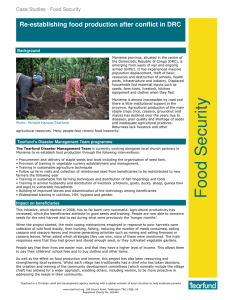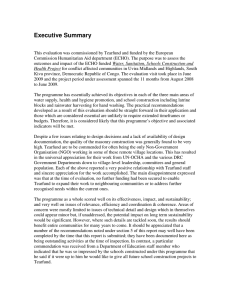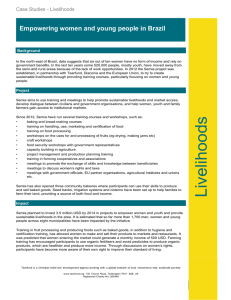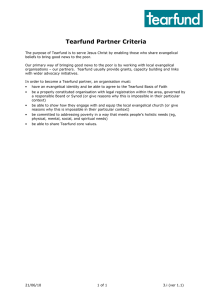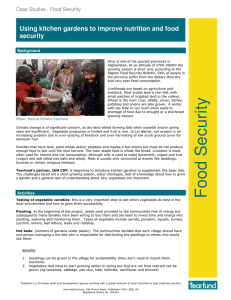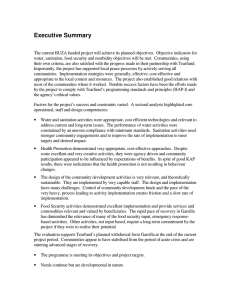Improving food security in communities affected by conflict in DRC Background
advertisement
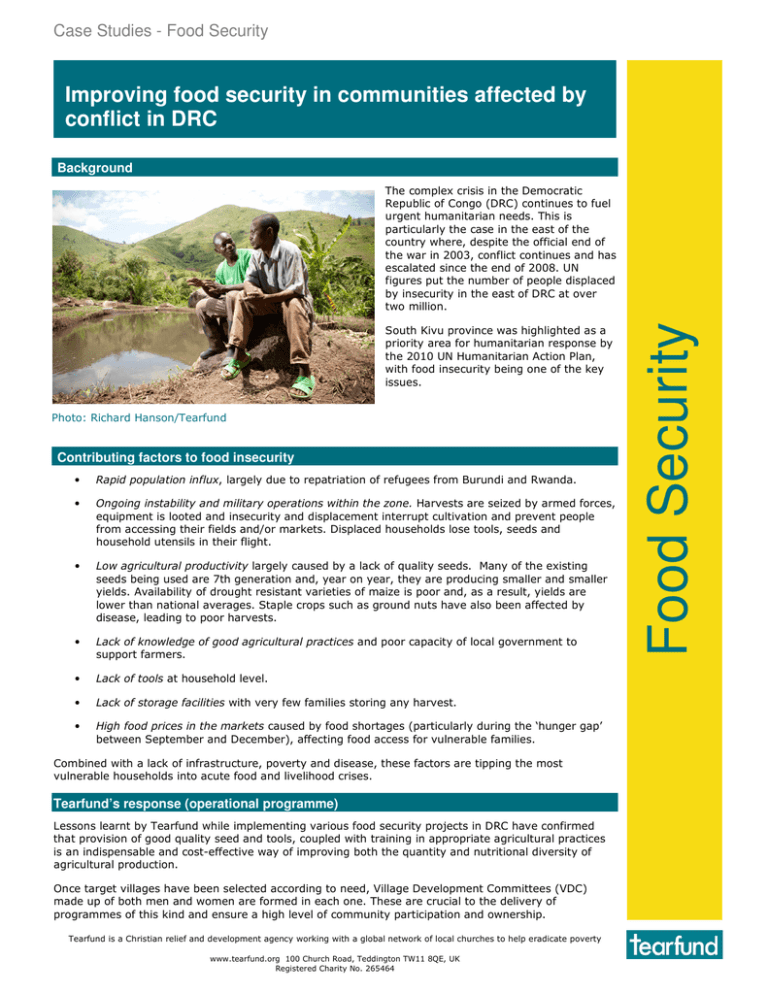
Case Studies - Food Security Improving food security in communities affected by conflict in DRC Background South Kivu province was highlighted as a priority area for humanitarian response by the 2010 UN Humanitarian Action Plan, with food insecurity being one of the key issues. Photo: Richard Hanson/Tearfund Contributing factors to food insecurity • Rapid population influx, largely due to repatriation of refugees from Burundi and Rwanda. • Ongoing instability and military operations within the zone. Harvests are seized by armed forces, equipment is looted and insecurity and displacement interrupt cultivation and prevent people from accessing their fields and/or markets. Displaced households lose tools, seeds and household utensils in their flight. • Low agricultural productivity largely caused by a lack of quality seeds. Many of the existing seeds being used are 7th generation and, year on year, they are producing smaller and smaller yields. Availability of drought resistant varieties of maize is poor and, as a result, yields are lower than national averages. Staple crops such as ground nuts have also been affected by disease, leading to poor harvests. • Lack of knowledge of good agricultural practices and poor capacity of local government to support farmers. • Lack of tools at household level. • Lack of storage facilities with very few families storing any harvest. • High food prices in the markets caused by food shortages (particularly during the ‘hunger gap’ between September and December), affecting food access for vulnerable families. Combined with a lack of infrastructure, poverty and disease, these factors are tipping the most vulnerable households into acute food and livelihood crises. Tearfund’s response (operational programme) Lessons learnt by Tearfund while implementing various food security projects in DRC have confirmed that provision of good quality seed and tools, coupled with training in appropriate agricultural practices is an indispensable and cost-effective way of improving both the quantity and nutritional diversity of agricultural production. Once target villages have been selected according to need, Village Development Committees (VDC) made up of both men and women are formed in each one. These are crucial to the delivery of programmes of this kind and ensure a high level of community participation and ownership. Tearfund is a Christian relief and development agency working with a global network of local churches to help eradicate poverty www.tearfund.org 100 Church Road, Teddington TW11 8QE, UK Registered Charity No. 265464 Food Security The complex crisis in the Democratic Republic of Congo (DRC) continues to fuel urgent humanitarian needs. This is particularly the case in the east of the country where, despite the official end of the war in 2003, conflict continues and has escalated since the end of 2008. UN figures put the number of people displaced by insecurity in the east of DRC at over two million. Case Studies - Food Security The VDCs play a key role in selecting beneficiaries, as well as in distributing seeds, food, mobilising beneficiaries for training and organising voucher fairs for agricultural tools. Furthermore, they take a lead role in settling agriculture-related conflicts that may arise in their villages. Training and vouchers for tools and seeds After conducting a baseline survey, training is provided in sustainable agricultural practices for producing staple crops (maize, beans and cowpeas) and vegetables. The training sessions take place with groups of farmers in the villages and coincide with the distribution of vouchers for tools and seeds. Food is also provided to all beneficiaries to meet urgent food needs during the pre-harvest ‘hungry gap’, thus protecting the seeds and enabling cultivation. Topics covered by the first two training sessions: 1. Land selection and preparation 2. Planting practices 3. Cultivation methods 4. Weeding 5. Crop protection, pest control and disease management 6. Soil structure and soil fertility management 7. Soil erosion and water control 8. Harvesting techniques A simple leaflet is distributed showing good planting and cultivation techniques that have been discussed. The leaflet is printed in Swahili with clear pictures to ensure comprehension is not dependent on literacy. Once seeds are distributed, village-level animators, extension workers and agronomists support and provide ongoing training for beneficiaries. They regularly visit beneficiary plots to provide advice and assistance as well as to identify what is working and where people need more inputs. Usually a number of beneficiaries emerge as early adopters – their fields then become demonstration plots for other beneficiaries to copy and also places where interactive sessions can be held. Impact on the beneficiaries In one community where Tearfund has worked, 77% of the farmers who reported an increase in agricultural production attributed the change to the use of improved farming practices. Field visits reveal that beneficiaries develop a new-found discipline, and once they experience the benefits, they have no problem in continuing with the practice. Households are encouraged to farm together in combined plots in order to increase their competitiveness in the market place. A third group training session is held in villages before the harvest is gathered. This focuses on postharvest activities such as handling and storage, seed selection, multiplication and retention, food processing and utilisation Vegetable gardening and nutrition training Homestead vegetable gardening is promoted to increase access to vital nutritional diversity, vitamins and minerals. Vegetable seeds, training and ongoing support are provided by community animators. All the promoted crops are grown locally but not all farming households currently cultivate vegetables because of the additional labour involved. However, vegetable gardening can provide a valuable source of income, as well as improving nutrition, and usually a number of beneficiaries emerge as early adopters. As the positive benefits of this activity are demonstrated, take up increases exponentially within communities. In any programme of this type, Tearfund – through the training of existing local health promoters where possible – also provides training for all beneficiaries in the importance of good nutrition and its impact on health. Tearfund is a Christian relief and development agency working with a global network of local churches to help eradicate poverty www.tearfund.org 100 Church Road, Teddington TW11 8QE, UK Registered Charity No. 265464 Food Security The training sessions are timed to be in harmony with the farmers’ seasonal activity calendar to ensure relevance and help farmers put knowledge into practice immediately. They are delivered by Tearfund staff alongside community animators, agricultural extension workers and VDCs. The training is practical and where possible, it uses example plots that are maintained by the VDCs for practical demonstration. By combining the training with distribution, beneficiaries have an incentive to attend, and it ensures that seeds and tools are distributed to those who have undergone training and thus have the knowledge to ensure the inputs are used effectively. Case Studies - Food Security Training topics covered: • • • • • food types essential for good health (carbohydrates for energy, protein for construction and vitamins/minerals from vegetables for protection) food necessary for pregnant mothers, breast feeding mothers and the sick the nutrition necessary for 0-5 year old children food preparation for families methods of storing food Food Security Practical cooking demonstrations are included to demonstrate good food preparation and how food stuffs can be combined on a weekly basis to ensure good all-round nutrition. Tearfund is a Christian relief and development agency working with a global network of local churches to help eradicate poverty www.tearfund.org 100 Church Road, Teddington TW11 8QE, UK Registered Charity No. 265464
